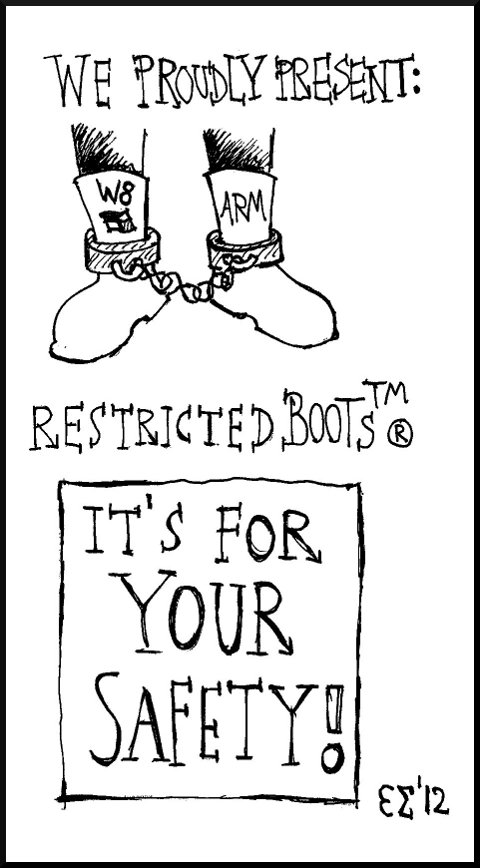12.11.12
Posted in Europe, Patents at 8:32 pm by Dr. Roy Schestowitz
Spain co-opted by Eurocrats

Summary: A company that spreads (in the distribution sense) Linux in Germany and the UK agrees to pay Microsoft for unnamed patents just as the European Parliament opens a potential door to software patents in Europe
HERE WE GO again. Patents that have no validity in Europe, at least based on the unclear rules (as such), are being used to harm Linux/Android and Microsoft is behind it, as usual. For those who are new to this site, in 2009 we showed how Microsoft extorted TomTom, a Dutch company, after a nearby German court had validated software patents on FAT. Microsoft has been pushing hard for software patents in Europe, more often not using proxies like ACT, which pushed hard for the predecessors of the Unitary Patent. Now that we see patent terrorists like Horacio Gutierrez in the news we are reminded of the great dangers of enabling software patents in Europe.
In recent years, Microsoft managed to find companies which willingly paid extortion money for ‘protection’, mostly in Japan and the US (or neighbouring countries) where software patents have more legitimacy. Today in the news we see this in action in Europe. The racket is expanding. As a reminder of news we covered earlier, Eurocrats let the passage for software patents be, as covered in the European Union’s Web site:
EU inventors will soon be able to get a unitary patent at last. After over 30 years of talks, a new regime will cut the cost of an EU patent by up to 80%, making it more competitive vis-à-vis the US and Japan. MEPs cut costs for small firms and tailored the regime to their needs, in a compromise deal with the Council endorsed by Parliament on Tuesday,
The BBC has just covered it as follows, not mentioning the opposition from Italy and Spain quite clearly, instead saying:
Italy and Spain suggest that as a result “commercial trade in innovative products will be favoured for undertakings which work in German, English or French”.
But a senior adviser to the European Court of Justice has advised that it reject their plea. A panel of judges has still to consider the case.
Software patents
Eurochambres – an organisation that represents EU countries’ chambers of commerce – called the vote in favour of the scheme a “breakthrough”.
“[It] will significantly reduce administrative burdens and boost European innovation,” it said in a statement.
However, April – a French free software-advocacy group – has warned the move could open the door to software-patent litigation on a scale recently seen in the US.
It says the European Patent Office (EPO) has shown itself willing to grant thousands of software patents – and worries the EU could end up with a system in which appeals against such judgements are decided according to the EPO’s own rules.
“MEPs voted in favour of a legally uncertain system that does not not provide any checks and balances against threats to innovation such as software patents,” said spokeswoman Jeanne Tadeusz.
“The European Patent Office will gain amazing powers, even though its governance has been highly criticised, especially with regard to its practice of granting software patents, against the letter and the spirit of European patent law.”
On the very same day we find this report about a European company paying Microsoft for unnamed software patents, too. To quote:
Microsoft has reached more patent licensing agreements with Android device manufacturers, closing a deal with Hoeft & Wessel, an IT and engineering technology group that specializes in ticketing, parking and mobile solutions in Germany and UK, and Cat brand owner EINS.
As usual, the exact terms of the agreements were not disclosed, but it provides Hoeft & Wessel and EINS with ‘broad coverage’ under Microsoft’s patent portfolio for the companies’ devices running the Android platform.
More specifically, Hoeft & Wessel builds and sells Android-powered handheld devices and terminals for the public transportation, logistics and retail industries across Europe, and will henceforth have to pay Microsoft royalties for the privilege. As will EINS, which manufactures Android tablets under the Cat brand in Germany.
Hoeft & Wessel and EINS have been added to our list of companies to avoid for their participation in the Microsoft racket. Novell was the first such company, which is also the company that helped legitimise and kick off the practice. █
Permalink
 Send this to a friend
Send this to a friend
Posted in Europe, Patents at 2:48 pm by Dr. Roy Schestowitz
Battle against European interests takes a “unitary” costume
.jpg)
The Battle of Trafalgar
Summary: Early reports suggest that the back door for software patents in Europe gets past another hurdle
ONE particular Web site says that “[the European p]arliament approves EU unitary patent rules,” but we are not sure just how irreversible that is. To quote the news site in question:
In three separate voting sessions, MEPs approved the so-called “EU patent package” (unitary patent, language regime and unified patent court).
Here is a less definite claim. As as reminder, this impacts software patents in Europe, so it is a very important matter which deserves more media attention. Those in charge are snubbing opposition, which only discredits any decision that is made.
We tried to find some clarifications in Twitter, but so far we have found none. A lot of MEPs are completely misguided and easily deceived/bamboozled by the propaganda.
MEP Chris Davies wrote that “MEPs just voted to introduce a common EU patent law, with translations into just 3 languages. Cuts costs hugely. Big boost for innovators.’
The FSFE’s Karsten Gerloff writes: “MEP Lichtenberger: Current proposal won’t create a European patent”
And also: “Lichtenberger: EPO often goes up to and beyond limits of patentable subject matter on life, software, other matters ”
Glyn Moody commented on one of Gerloff’s tweets: “MT @kgerloff MEP Karim: We need more patents on everything to compete w/ China, US #swpat >>show us the evidence, then”
One can see how deluded those people are. Monopolies have an adverse effect.
Maël Brunet writes: “Gallo credits nonsense on supposed correlation between innovation and number of patents filed”
The FFII’s mailing lists have had a bunch of posts today. One message from Elver says that today’s press release on the unitary-patent.eu website (by April) claims: “A possible recourse by a Member State before the ECJ could finally sack the entire text for its illegality: the opinion of the Advocate general alludes to the result of such action is far from being certain.”
The question is: “What is meant by this? Does it mean that if a member state asks the ECJ’s opinion, the ECJ could sack the whole thing? Or what’s going on here?”
“The fundamental problem is that this process is not open to any citizen,” says another poster.
Another FFII subscriber says: “Can you point me to the relevant part of the TFEU and how such a request would be made? Does it involve the parliament? And what would be some problem areas that should be looked at? We have some friends at the Ministry of Justice as well as the parliament, so if this is something the parliament can request as part of the ratification process (assuming there is a ratification process), then I think there’s a good chance we can get it done here in Estonia.”
Benjamin Henrion, the FFII’s president, says that “[a]ny Member State can do it. So a vote in a National Parliament would be a start.” MEPs tend to override local sovereignty, so no wonder hostile policies can be passed, clearly against the interests of citizens. █
Permalink
 Send this to a friend
Send this to a friend
Posted in Patents at 1:58 pm by Dr. Roy Schestowitz
The core of this problem requires striking at the root

Summary: The cartel office (USPTO) has become the target of some of its victims, who see their system abducted by bureaucrats and self-serving non-practising blood-sucking leeches
THE USPTO has become the shadow of corporations, cast upon by those in power to repress the creative population. The patent system in the US is rotting because too many lousy patents are granted, often to trolls that hide behind shells and destroy the economy.
The troll known as “Clouding IP LLC” strikes again, joining the likes of Lodsys, which is also suing some more:
There are all kinds of patent trolls making outrageous claims about the technology they “own,” but there’s no question that Lodsys is one of the most infamous. Last year, Lodsys explained how it was generously offering to let the iOS and Android app developers of the world continue to do business—if they pay a patent tax of 0.575 percent of their revenue.
Lodsys gets some patents from Intellectual Ventures, the biggest troll which uses many shells for litigation. This is the largest such cartel and it is backed by ruthless businessmen like Bill Gates. Here is an interesting new report about changes that would impede that racketeering operation:
Figuring out the specifics of Intellectual Ventures’ frighteningly enormous patent portfolio has always been next to impossible. Its roughly 8,000 U.S. patents and 3,000 applications are assigned to an assortment of 1,276 shell companies, few of which have Intellectual Ventures in their name, according to a study published in January in the Stanford Technology Law Review. Nor is the company alone in playing shell games with its portfolio: Devices to mask patent ownership are the exception rather than the rule for companies with a business model of asserting IP rights.
The USPTO, the principal facilitator of such extortion, considers changing its rules due to that. Another bit from the group of Bessen [1, 2] estimates the cost of trolls. To quote:
Today it is perfectly legal for companies to buy and sell the rights to unlimited numbers of ideas, a company is not required to have any interest in making these ideas a reality. It is perfectly legal for companies to sit on patents and wait for others to create before either suing the creator or charging licensing fees. The following pair of quotes is pulled directly from the promotional material on the website of just one prolific patent troll:
“$2 Billion+ cumulative licensing revenue”
“70,000 IP assets acquired and nearly 40,000 in active monetisation programmes”
In fact it is not just legal, patent trolling is an industry on a colossal scale. According to research recently published by Boston University School of Law, last year patent trolls won a cool $29 Billion. One of the most worrying findings of research in to patent trolls is that the mere threat of a suit is enough to put the frighteners on and make creators pay up:
Another parasite, Vringo, got Nokia patents after Microsoft had taken over and then attacked Google. Here is a financial report about it:
This article provides a unique discussion of broad economic conditions in software, energy, human labor, and patents. The discussion highlights upside and downside characteristics in the patent space, and argues software patents are overvalued relative to other industries. The article then provides an investment conclusion of selling Vringo (VRNG) shares and buying Lightbridge (LTBR) shares.
To bypass the macro discussion, scroll down to the bold heading containing the text “Dump Vringo”
Software is hot.
Investors are concerned about bubble-like conditions. Inside this bubble float software patents, gaseous substances which have been reified as solids in public perception. A crescendo of such reification is scored by the America Invents Act, which introduced “first to file” priority, overturning the “first to invent” principle which has been around forever. Instead of inventions, patents themselves are now the property; in a classic sense of reification, words have stolen the identities of the ideas they describe.
We are taking the word “property” far too literally, as if the government had announced a race for land, as if patents were a hard asset like real estate. Fiat currency is a far more appropriate analogy. Patents are inflated and deflated at the whims of politicians, and frequently counterfeited by artistic lawyers in a game of litigation shakedowns. A land run among investors in this now-crowded space occurs atop thin ice.
Paul Kedrosky shows that patent trolling pays well:
Doing useful stuff is apparently for chumps: A portfolio of patent trolls vs the S&P 500 in 2012 pic.twitter.com/ghv3uKEl
The USPTO made this legal and now its head leaves in shame (its heads come from the cartel it protects), having lost some public arguments:
The patent community has had plenty to talk about with two recent actions by David J. Kappos, the Director of the United States Patent & Trademark Office (USPTO).
On November 20, 2012, in an address to the Center for American Progress, Director Kappos gave a full-throated defense of software patents in response to recent public criticisms of software patents stemming from the so-called “smartphone patent wars.” As part of the defense, Kappos recounted several recent efforts to improve overall patent quality, including the quality of software patents. (Read a summary of those efforts here). Then on Monday, November 26, 2012, Kappos announced to USPTO staff that he would be stepping down as Director in early 2013. (See reports here and here.) According to news reports, USPTO deputy director Teresa Stanek Rea will assume the role of acting director upon Kappos’ departure in 2013. Kappos’ resignation seemed to catch a number of commentators by surprise and the USPTO has not yet provided further details or an official release.
USPTO is said to be preparing for lawsuits over its bad practices which pro-fascism politicians like Leahy try to take global:
Congress has passed a bill that would implement two patent law treaties to help American businesses expand into foreign markets, Senator Patrick Leahy (D-Vt.) announced today.
Stop giving the corruptible, corporate-serving USPTO more power abroad. This lets software patents expand. And not just software in fact. For instance, citing the article “Bill Gross Patents Way To Count”, Mike Masnick slams yet more USPTO-granted patents, saying:
I’m reminded of that, after seeing Dealbreaker’s headline about how world famous mutual fund investor, Bill Gross, of PIMCO, has patented the methodology for his bond fund — or, as Dealbreaker correctly points out, he “patented a way to count.” Indeed, the patent in question, US Patent 8,306,892 is somewhat hideous, describing not much more than the concept of an algorithm that weights regions based on GDP.
Here is more from Masnick:
The next big case to pay attention to concerning software patents appears to be the CLS Bank v. Alice Corp. case, which is being reheard “en banc” (by the full slate of judges) at the federal circuit court of appeals (CAFC). The short version of the case is that it involves a patent over the idea of software that conducts a “shadow transaction” to make sure that there are enough funds to complete a real transaction, before allowing the real transaction to go through, thus minimizing “settlement risk” (the risk of the deal not actually being completed). Should that be patentable? Well, that’s part of the argument. The district court tossed out the patent as being simply about an “abstract idea,” which is not patentable, as abstract ideas are excluded from section 101 of the patent act, which lists out patentable subject matter. On appeal, a divided three judge panel overturned the lower court, and said that when you looked at the invention as a whole, it was patentable subject matter under section 101. The full CAFC has agreed to rehear the case, and the amicus briefs are flowing in, as people realize that this case is the next key battleground over software patents.
Of course, as often happens in these kinds of cases, you get amicus briefs with wildly divergent claims. For example, here we’ll show and discuss the briefs from both the EFF and the Business Software Alliance (BSA). Somewhat surprisingly, both of those briefs agree on one thing: that the actual patent in question should be ruled invalid, as in the district court ruling. But that’s about the extent of the similarities between the two — who paint extremely different versions of the world of software patents today. The EFF brief explains how damaging software patents are to innovation and the wider economy while the BSA brief talks about how software patents are the greatest thing ever for innovation. One of these three-letter-acronymed organizations is wrong, and it’s not the EFF.
The EFF is also getting involved now:
The Electronic Frontier Foundation (EFF) urged the full Federal Circuit today to throw out the dangerous patents it previously held valid in CLS Bank v. Alice Corp, arguing that the court’s earlier decision goes against the law and helps foster the recent dramatic increase in patent litigation. In the amicus brief filed today, EFF proposes that the court require patent owners to claim what they actually invent and nothing more.
“The Patent Act doesn’t protect abstract ideas because it would lead to harmful monopolies on simple ideas, like ways of running a business or cooking a meal,” said Staff Attorney Julie Samuels. “Yet we’re still routinely seeing patents issued based on abstract ideas, and having those patents upheld in some courts. In an environment like this, it should be no surprise that company after company decides to buy a lottery ticket in the guise of a dubious software patent and see if it can hit the jackpot. The Federal Circuit has a chance to help curb this new rash of patent lawsuits.”
The system has been abducted by monopolies. It is time to sue it, abolish it, or whatever it takes, but it won’t be easy when everyone including politicians is bought (bribed). The USPTO is not an independent body; it is controlled by its major clients, i.e. companies like IBM, which also control the politicians. People who call for ending the Federal Reserve are perhaps missing another important institution that needs ending and that’s the USPTO, perhaps wirh the exception of trademarks. █
Permalink
 Send this to a friend
Send this to a friend
Posted in Apple, GNU/Linux, Google, Patents at 1:32 pm by Dr. Roy Schestowitz

Summary: Apple loses a key patent, secrecy and market cap following a new series of events
A patent which is essential to Apple’s battles against Android has quite inevitably just died (tentatively), but Apple fans sites (calling themselves a cult) spin invalidated as “discredited”. More to come perhaps: “US Patent #7,479,949, claiming a “[t]ouch screen device, method, and graphical user interface for determining commands by applying heuristics,” essentially covers iOS’s ability to respond when a user is trying to scroll vertically in a document, or trying to move around within the document in multiple directions. It also covers iOS’s ability to discern the difference between swiping among images in a gallery, or panning or zooming within the image.”
Pamela Jones wrote:
Apple’s ’949 patent, “Touch screen device, method, and graphical user interface for determining commands by applying heuristics”, the 7,479,949 patent, has just been preliminarily ruled invalid by the USPTO, claims 1-20. This is a pivotal patent for Apple’s legal strategy, trying to carve out ownership of what it called the “Distinctive Apple User Experience” in the HTC-Apple settlement agreement.
This news could not come at a much better time because Apple is to present a list which depends on the patent. Jones adds:
Apple claims Samsung is trying to correct a mistake, and there is a long song and dance about how horrible Samsung is acting, trying to fix the error. The judge may well agree, but on the other hand, Apple is asking to ban Samsung products from the US entirely, and that’s a serious matter for Samsung, so one might argue that it surely doesn’t hurt to get it right and have all the evidence on the table to make a correct decision. I’ll show you Samsung’s reasons for asking to submit the supplemental declaration as well.
Some sites are advocating lawsuits by Apple, whereas others, including Judge Koh [1, 2] are calling for peace (it is up to Apple at this point). As one reporter put it: “Apple and Samsung met again during an appeal hearing on yesterday to argue over the $1 billion that was rewarded to Apple over the summer after Samsung was accused of patent infringement. Judge Lucy Koh is currently reviewing the jury’s $1.05 billion verdict against Samsung, but had some things of her own to say to the two companies bickering back and forth: “global piece.””
“She should talk to the lawmakers then,” wrote Ondrej Michalek. Here is coverage of the need for transparency:
The court quickly granted Samsung’s request and has now gone a step further, saying that the agreement itself should be made public, except for pricing and royalty terms. Bizarrely, it was actually Samsung who sought to have the information about what patents were included under seal — such that it could see it, but the public could not. Either way, the judge has made it clear that the patents need to be made public as there’s no compelling interest in keeping them secret.
Here are the details:
Apple-HTC settlement unsealed: No “cloned products,” no helping trolls
[...]
The 143-page settlement [PDF] is heavily redacted, and no financial terms are revealed. Still, certain parts of the document are revelatory. The document outlines an arbitration process that Apple can initiate if it believes HTC has created a “Cloned Product” that apes Apple’s too closely. It gives specific examples of similarities that would be acceptable and others that would be verboten. “Pinch to zoom” is OK; “slide to unlock” is OK, but only if it looks different.
Jones covered what is clearly a one-sided deal. Apple and Microsoft try to crush Android with patents before Apple becomes just another Nokia. Google is building a patent arsenal, considering in the process a purchase of patents together with Apple. This report about Kodak patents says: “Niki Fenwick, a spokeswoman for Mountain View, California- based Google, said the company doesn’t comment on rumor or speculation.”
If true, then Google is still becoming part of the cartel — one that the USPTO facilitates along with dubious agencies like FTC and ITC which like to discriminate against Android players like Motorola. Perhaps a punishment for not being part of the cartel?
In all fairness to Google, it does actively try to stop software patents and as LWN put it:
A brief has been submitted to the US Court of Appeals; signed by Google, Facebook, Red Hat and several other companies; stating that the combination of an abstract idea and a computer should not be eligible for patent protection
After Apple got downgraded and all that bad news came in its stock fell:
Today, Apple shares fell 6.43 percent to 538.79, which represents a $34.8 billion market cap write-off. Analysts have been looking for reasons for the drop all day long without finding a single one that stands out. They forgot about the long-term perspective.
During the past 12 months, Apple shares have been up 42.7 percent, mostly due to two new products, the iPhone 5 and the iPad mini. With a new CEO and no new product in sight, volatility kicks in. The smallest downturn leads to a huge stock drop. Reporting about stock variations often means focusing on short-term activities.
This is why Apple is suing. Android stole its thunder. █
Permalink
 Send this to a friend
Send this to a friend
Posted in GNU/Linux, Microsoft at 12:58 pm by Dr. Roy Schestowitz

Former Microsoft President Stephen
Elop (now Nokia CEO), photo by Luca Sartoni
Summary: It’s time for Nokia to redeem itself from the abyss which is Windows
A Finnish reader of ours says that “Linux on the tablet and smartphone will probably lead to exploration of Linux on the desktop. That is if restricted boot does not become too much of a barrier.” He also shares this article about the latest Finnish casualties of Microsoft entryism:
Nokia Corp.’s hulking glass-and-steel headquarters overlooking the Gulf of Finland was built in several phases with half-a-million square feet of space, enough room for thousands of employees to take the onetime galoshes maker to the top of the world’s cellphone market. Today, the building houses just 1,800 workers and, as of Tuesday, has a landlord.
Nokia should have gone on with some form of Linux. Android is leading by a large margin:
Android Won. Windows Lost. Now what? We have passed the tipping point now, the balance has tipped and can’t be flipped. The Platform of the Century will power cameras, credit cards, cellphones, computers, consoles, clocks – and collect consumer insights on our consumption.. Ok. The numbers for Q3 are in, inwhat I anticipated to be the “smartphone bloodbath” three years ago, that would last long into this new decade. That was then, when the battle was joined, and since have called and the battle of the century, the battle for the pocket, the battle for the platform to control the digital destiny of humanity.. that battle, the biggest race of all time – has been won. Already? But we barely got to know you? Yes.
The latest implosion of Nokia is serious news. It didn’t have to end like this and Wired says that companies like Nokia should consider another operating system:
It is exactly 21 years since the Linux kernel was made available under the open sourced software development model. Although Linux quickly found a home in the server and then desktop world, the mobile Industry was much slower to embrace it. It’s only in the past 5 years that we have witnessed significant adoption driven by Google’s Android platform. In part, the mobile industry was slower to move as most device vendors viewed their legacy platforms as containing their core DNA which enabled them to differentiate in the market.
People thought that Nokia has regained its ability to think when it advertised a Linux job, but that seems to have been a misunderstood advertisement. As things stand at the moment, Microsoft will make Nokia the next Novell or Yahoo, harming the Finnish economy. The Microsoft booster says that Microsoft now relies on Nokia and “bad news for Microsoft” called it Glyn Moody. █
Permalink
 Send this to a friend
Send this to a friend
Posted in GNU/Linux, Vista 8, Windows at 5:30 am by Dr. Roy Schestowitz

Summary: UEFI horror stories written in conjunction with stories from people who reject Vista 8
The Vista 8 fiasco is understood by many who constantly rant having actually used it. One blogger from Harvard called it a Xmas gift for someone you hate. Here is an aspect which Pamela Jones says might be due to Apple patents:
What is the best feature of iOS on the iPad? A permanent hardware Home button. It isn’t as convenient as going “Back” on Android but at least it facilitates re-navigating to wherever you were. The closest thing to a full-time Home button in Windows 8 is the “windows” key on the keyboard (but the whole idea is that the keyboard is not always available/required).
Vista 8 is not suitable for desktops because it was not truly designed for them. This leaves an opening for real desktop operating systems such as Ubuntu, but Sam Varghese says that Vista 8 makes the migration to Ubuntu harder using UEFI:
It is difficult to recall, in the recent past, a new technology about which there has such an avalanche of uninformed writing, misinformation or secrecy than secure boot.
Secure boot is one feature of the Unified Extensible Firmware Interface, or UEFI, the replacement for the BIOS on common hardware devices like PCs and laptops. (This is commonly referred to as the UEFI BIOS and I shall use this term right through this article).
Microsoft has implemented secure boot in a certain manner and since all hardware manufacturers will be following suit, any vendor of an operating system other than Windows has to follow Microsoft’s system to get their operating systems to boot on machines on which secure boot is in operation. All devices that come with Windows 8 pre-installed have secure boot turned on.
This is not a coincidence and it has little to do with security if the following is true:
The UEFI interface can enroll the hash of the Linux kernel to be booted securely and he has no need to sign anything…
Well, Vista 8 is not selling based on some new numbers and Carla Schroder does allege that UEFI may be part of an anticompetitive plot:
I think UEFI Secure Boot is a shuck and a bald-faced Microsoft anti-competitive tool. I’ll get to my reasons in a moment, because my most important point comes first:
Every purchase of a Windows license is an attack on Linux. Linux has not won, and Microsoft is as dangerous as ever.
[...]
Those are just two out of many hundreds of possible examples. And now we come to the UEFI Secure Boot. A lot of people are all excited over the phrase “Secure Boot” because it sounds like a good thing. Sure, who wouldn’t want a secure boot to keep all those pre-boot malwares off their nice Linux boxes?
What Linux pre-boot malwares? If you’re multi-booting Linux and Windows, then you’re at risk for everything. If you’re not running Windows I can’t promise that you’re immune. But your risk is magnitudes lower.
The biggest flaw in Secure Boot is the spec requires a single Platform Key. You can add more keys, but they must be signed by the Platform Key. This is the cause of all the woe from Microsoft requiring all Windows 8 systems to ship with Secure Boot turned on– if you want to multi-boot Linux and Windows 8 you have to disable Secure Boot, or figure out how to generate keys for Linux that are signed by the Windows Platform Key. You cannot easily use Secure Boot for Windows 8 and disable it for Linux.
Carla posted a correction, but her main points stand unchallenged. Microsoft is playing dirty again because Vista 8 just won’t sell. Here is a new report:
Jefferies Reins In Global PC Sales Expectations, Lowers Microsoft Estimates & PT
Jefferies’ Peter Misek has a note out today on global PC sales, and it isn’t optimistic.
Misek maintained his below-consensus 2012 estimate of -4% year-over-year for branded PCs, with fourth quarter shipments down 5% year-over-year. He notes two main reasons: “1) Jefferies HK/China Technology analyst Ken Hui believes component pull-in by PC OEMs was 10% below forecast in October, with Lenovo and Asus relatively better. 2) Jefferies Japan Computer Hardware analyst Masahiro Wakasugi believes the HDD production forecast should be closely watched. HDD production forecast for CQ4 that was made in early Oct was 141-142M units but in mid-Nov was revised to ~136M since the initial reaction of Windows 8 PC by consumers was not as strong as expected. If sell-through during Black Friday is weaker than expected, HDD production forecast would be cut again in mid-Dec, which should be closely monitored.” Misek also notes that U.S. consumer holiday PC sales are down as much as 20% year-over-year.
Bill Gates-funded press airs Microsoft friends like Dina Bass, who also cannot spin this positively. Also see [1, 2, 3]. Don’t let Microsoft get away with Linux sabotage just because its own product is botched. Microsoft may think that Windows is just entitled to survive, no matter the methods; let them know what you think. █
Permalink
 Send this to a friend
Send this to a friend
Posted in Patents at 5:15 am by Dr. Roy Schestowitz

Summary: The debate about patents is taken over by non-practising entities
LET us restate the claim that the problem is not “bad” patents, the problem is that software patents, among other types of patents, are inherently bad. Gene Quinn, a patent lawyer and vocal proponent of software patents, says that “The Enforcement of Bad Patents is the Problem,” once again evading the real issue. Paralegal Pamela Jones responds with: “That depends on whether or not you believe that software is mathematics and hence nonpatentable subject matter. Yet the patents keep on coming. The article is basically an advertisement for Article One’s crowd sourcing of prior art searching, as if that is the solution. That alone makes me question Article One, frankly. But what nobody seems to grasp is that having to spend millions to defend against bad patents is the problem, and having to go through it at all means the solution he offers is the wrong answer.”
She later rebutted other misleading pieces from Quinn (we try to reduce links to these), whom we wrote more about in [1, 2]. Advocating for trolls and parasites is being a watchdog for wrongdoers.
“Advocating for trolls and parasites is being a watchdog for wrongdoers.”What we have here is the bias of patent lawyers. Some legal/lawyers’ Web sites are still full of it. Dennis Crouch is just one example of this. They help themselves and businessmen tax scientists at great expense to society as a whole.
Here is belated news from a lawyers’ site about Kappos leaving USPTO. They’ll just need to find another lawyer to replace him.
It is clear that programmmers do not want software patents. The debate is rigged though. In Twitter, what seems like a lawyer keeps flooding the #swpats hashtag with pro-software patents tweets. We need to tackle this issue at the core; people who enable cartels are a major part of the problem. █
Permalink
 Send this to a friend
Send this to a friend


.jpg)





















 Content is available under CC-BY-SA
Content is available under CC-BY-SA